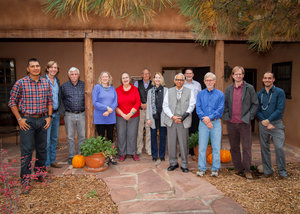ADVANCED SEMINARS / 2015 / Puebloan Societies: New Perspectives

Puebloan Societies: New Perspectives Across the Subfields
Chaired by Peter White Whiteley
October 18-22, 2015
Puebloan Societies: New Perspectives Across the Subfields
Over the last two decades new understandings have emerged of Puebloan social systems in all their diachronic and cultural diversity, necessitating a reassessment of cumulative knowledge. This seminar’s purpose was to address Puebloan social formations of the past and present from a variety of comparative perspectives, using a four-field anthropological approach. Analytic foci included kinship structures, ritual systems, and cosmology; site formation, transformation, and networks of inter-connection; horizontal and vertical transmission among ethno-linguistic groups; and demography, health, and longevity. The seminar’s aim was to reconnect the currently disjointed anthropological sub-fields, especially archaeology and ethnology, and to develop new perspectives on Puebloan social societies.
Seminar chair, Peter Whiteley, reported, “Puebloan Societies drew on a rich SAR tradition, including two early Advanced Seminars—New Perspectives on the Pueblos (1969) and Reconstructing Prehistoric Pueblo Societies (1968)—and the recent volume, A Pueblo Social History (2014), by John Ware (who served as our overall discussant). Scholars and subjects were selected to represent different ethnographic regions—Western and Eastern Pueblos—and time periods: from the ‘ethnographic present’ to the Pueblo II period, and points in between.”
Thematic discussions included:
- Pueblo Languages and Culture History
- Migrations vis-a-vis Social Units
- Western vs. Eastern Pueblos: a Sustainable Contrast?
- The Chaco influence: how significant/non-significant for post-Chaco Puebloan variations?
- Community integration mechanisms for migrants (Zunification, Hopification, etc) – ethnolinguistic purism vs. inter-Pueblo exchange
- “Upstreaming” (from ethnography to archaeology) and “Downstreaming” in Puebloan research
- Emic vs. etic perspectives on the past
- The question of leadership in egalitarian societies: inherited within kin groups vs. assigned within ritual sodalities
- Comparative implications of Puebloan social-political organization for worldwide Neolithic transitions
- Issues of emulation in inter-Pueblo and intra-Pueblo socio-ritual contexts
- ‘In the Beginning’ – Archaic origins of social organization, symbolism, beliefs, and ceremonialism
- Origins of moieties – via group-internal dynamics or amalgamation with immigrant groups
Whiteley concluded his report, “The papers are currently being revised for publication in a SAR Advanced Seminar volume, which we hope will provide a new benchmark in Puebloan studies. Overall the seminar was consensually felt to be a tremendous success.”
Peter Whiteley, Chair
Curator of North American Ethnology, Department of Anthropology, American Museum of Natural History
Joseph Aguilar
Ph.D. Candidate, Department of Anthropology, University of Pennsylvania
John J. Crandall
Ph.D. Candidate, Department of Anthropology, University of Nevada, Las Vegas
Richard I. Ford
Arthur F. Thurman Professor Emeritus of Anthropology and Botany, Department of Anthropology, University of Michigan
Severin Fowles
Associate Professor, Barnard College, Columbia University
Kelley Hays-Gilpin
Professor and Chair, Department of Anthropology, Northern Arizona University
Jane H. Hill
Regents’ Professor of Anthropology and Linguistics Emerita, School of Anthropology, University of Arizona
Barbara J. Mills
Professor, School of Anthropology, University of Arizona
Scott G. Ortman
Assistant Professor, Department of Anthropology, University of Colorado, Boulder
Triloki Nath Pandey
Professor, Department of Anthropology, University of California, Santa Cruz
Stephen Plog
Professor, Department of Anthropology, University of Virginia
John A. Ware
Director Emeritus, The Amerind Foundation